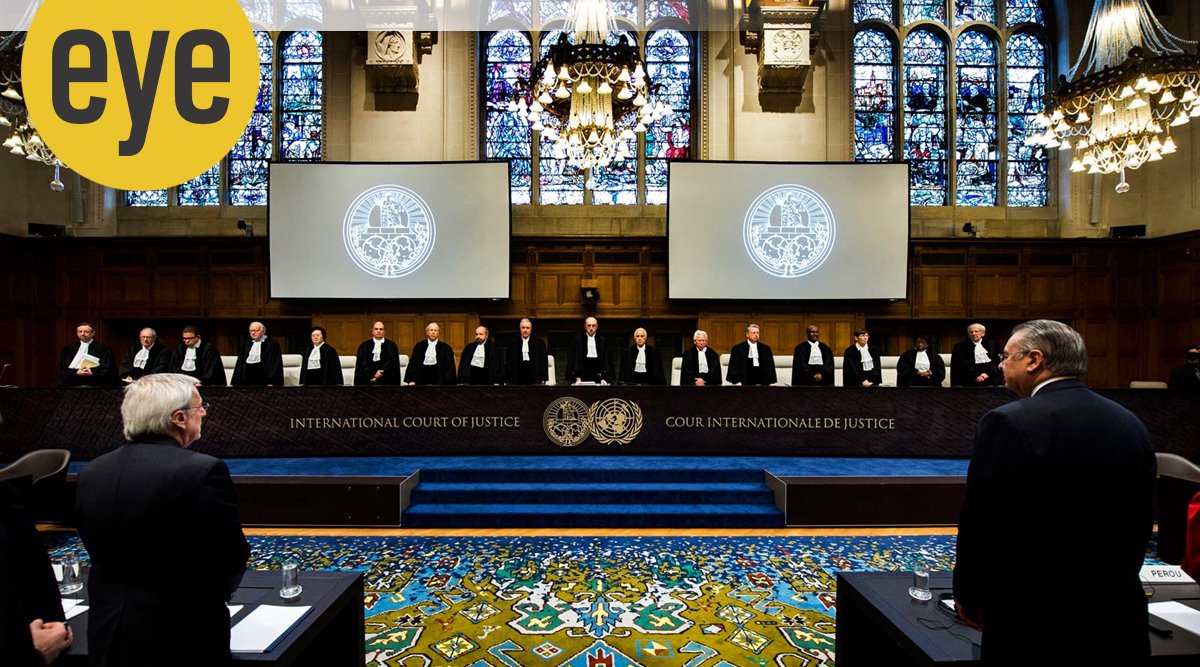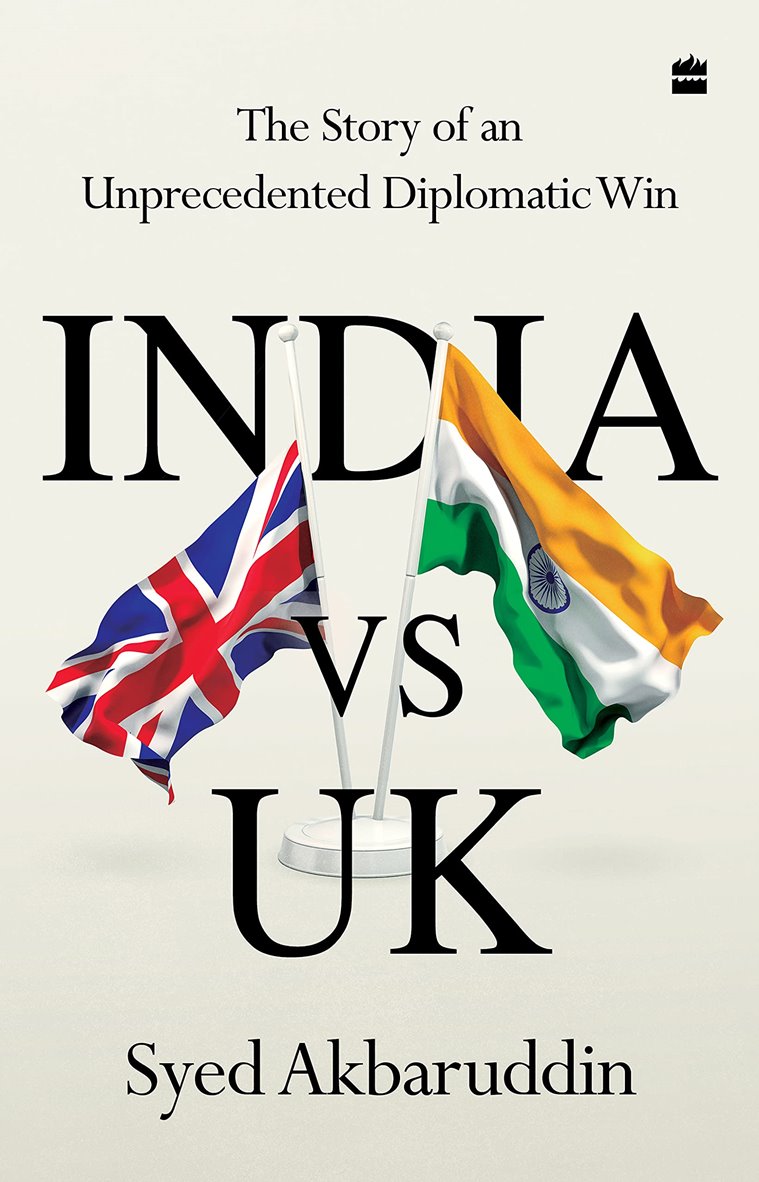 The seat of the International Court of Justice at the Peace Palace in The Hague, Netherlands. (Source: icj-cij.org)
The seat of the International Court of Justice at the Peace Palace in The Hague, Netherlands. (Source: icj-cij.org) Getting the better of a member of a permanent member (Big Five or P5) of the Security Council at the UN is always a moment to cherish but if the P5 member happens to be the colonial power that lorded over you, for nearly two centuries, the flavour has much more than a tinge of sweet. India’s win over the UK at the UN in 2017 for a seat at the International Court of Justice (ICJ) was just that and is the tale of the book, India vs UK, authored by Syed Akbaruddin, known as Akbar in the diplomatic fraternity.
The ICJ, popularly known as the World Court, is located at The Hague (Netherlands). In 2017, India decided at the last minute to field Justice Dalveer Bhandari, who had earlier been at the Supreme Court and was just finishing his term at the ICJ, for re-election even though all earlier indications were that this election would not be contested. The book essentially details the hectic pace in the Indian Mission to the UN in the six months from the decision to contest in the middle of the year to the election itself at the end of the year. Written in a diary form, it has been put together in a manner that forces the reader to keep wanting to know the next round of happenings.
 Justice Dalveer Bhandari
Justice Dalveer Bhandari ICJ judges are elected for nine-year terms through concurrent elections in the UN General Assembly and Security Council. A winning candidate must secure a majority in both the Assembly and the Council. Obviously, the elections are not contests of judicial prowess of the candidates but political power games among nations with candidatures announced years in advance and serious campaigning in New York and major capital cities. The P5 have a clear edge in the Security Council not only as they willingly bond with each other on issues such as their presence in key UN organs but also because the non-permanent members find it politically expedient to be on their right side. How tall the order was for India can be assessed by the fact that the ICJ confrontation was directly with the UK. And India was not on the Security Council that year.
The 2017 election saw six candidates contesting for five vacancies at the ICJ. Latin America and Africa had one candidate each from Brazil and Somalia, respectively, while the Europeans and Asia had two each. The two Europeans were from France and Britain, both countries being permanent members of the Security Council with a kind of “divine” right to key UN bodies. The two Asians were the Permanent Representative of Lebanon and Justice Bhandari. The Lebanese had long been canvassing for the vacancy that would be created by Justice Bhandari’s tenure coming to an end with no counter campaign by India.
Though there is no formal geographical seat allocation at the ICJ, the convention is that judges from one region are replaced by others from their own region. The results of the voting were, therefore, along expected lines when the candidates from Brazil, Somalia, France, and Lebanon went through. While, in that sense, India had “lost” the election, the nail biting moment was that the British candidate had failed to cross the halfway mark in the General Assembly with Justice Bhandari similarly placed in the Security Council. While, in the past, such scenarios had seen the candidate winning in the General Assembly prevail after multiple rounds of further voting, never had the opponent been a candidate from a P5 country. Conventional wisdom dictated that attrition would work for the P5.
 India vs UK: The Story of an Unprecedented Diplomatic Win by Syed Akbaruddin; HarperCollins India; 240 pages; Rs 599
India vs UK: The Story of an Unprecedented Diplomatic Win by Syed Akbaruddin; HarperCollins India; 240 pages; Rs 599 Justice Bhandari was eventually elected to the ICJ on November 20, and the British candidate, Christopher Greenwood, withdrew. The book vividly describes the last few days of political high-drama leading to this outcome, including an eyeball-to-eyeball meeting with the British Permanent Representative and the Security Council president to scuttle the British attempt to resurrect a rule from the UN’s predecessor, the League of Nations’ Permanent Court of Justice, to force a victory for themselves. Tackling “friends” and your own was also a necessity. Akbar had to push the US Permanent Representative to dial back not their vote, but at least efforts to persuade others to vote for the Britain. And, in his own backyard, so to say, where even though there was sterling support from the External Affairs Ministry, the Minister had to be gently told not to take a call from her British counterpart.
The book is also rich with nuggets of information pertaining to the UN and India at the UN. For instance, while many are aware of India’s charter membership of the UN, it is not well known that India’s first attempt at being elected to the Security Council in 1947 didn’t succeed, resulting, possibly, in huge political consequences that bedevil us to this day (the Security Council first considered the India-Pakistan question on January 6, 1948).
Akbar has been one of India’s most noticeable faces in the Indian Foreign Service in recent years, who helmed the office of the spokesperson for the Ministry of External Affairs and, thereafter, as India’s Permanent Representative to the UN. His book is certainly a story of an unprecedented win for India at the UN, but, in keeping with Akbar’s profile, it visibly brings home the changing power equations and India’s place in a new global balance. It is certainly a must-read for students of international relations but also for those generally interested in world politics.
(Manjeev Singh Puri is former Ambassador of India to the EU & Nepal and Deputy Permanent Representative to the UN)
- The Indian Express website has been rated GREEN for its credibility and trustworthiness by Newsguard, a global service that rates news sources for their journalistic standards.

